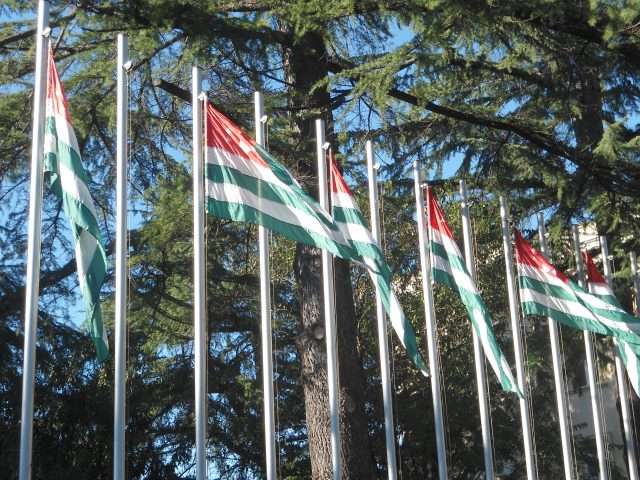
Kavkaz Files ISSN 2975-0474 Volume 26 Issue 1
Author: Silvia Boltuc
Executive Summary
The Abkhaz Academy of Sciences has introduced a scientific and technical program for 2024-2026 aimed at strengthening the country’s historical narrative and cultural identity. This program is significant for supporting Sukhum’s independence claims and countering Georgian territorial assertions through cultural diplomacy and international academic collaboration.
This report utilises SpecialEurasia’s database, past reports, articles from local media, and accounts from social media.
Background Information
The Abkhaz Academy of Sciences has started the “Addressing Topical Issues of Abkhazology and Caucasian Studies” program, which focuses on archival research, linguistic development, and cultural preservation. A program’s key component is the creation of a National Digital Corpus of the Abkhaz language to advance linguistic research and accessibility, supporting the development of comprehensive dictionaries and terminological databases.
The program also prioritises the collection and study of folklore and traditional cultural expressions, both in Abkhazia and within the diaspora, particularly in Turkey.
Geopolitical Background
According to Sukhum’s official statement, Abkhazia declared independence in 1992 despite the fact that international media and experts usually consider August 2008 the year which marks Abkhaz independence after the Russo-Georgian War and Moscow’s recognition of Abkhaz sovereign territory.
However, apart from Russia, only a few countries, including Nicaragua, Venezuela, Nauru, and Syria, recognise Abkhazia’s sovereignty. Tbilisi, the European Union, and the United States continue to consider the country as part of Georgian territory.
Before affirming its independence in 2008, the Abkhaz-Georgian War (1992-1993) highlighted Sukhum-Tbilisi’s confrontation on the Abkhaz territorial status. In 1992, Georgian military forces entered Abkhazia to regain control, leading to intense fighting and significant human rights violations. By the end of 1993, with the support of Russian and North Caucasian volunteers, Abkhaz forces expelled Georgian troops from the region.
Despite years of discussion within the international and academic community about Sukhum-Tbilisi’s confrontation, Abkhazia has become increasingly significant considering the Ukraine conflict, during which Kyiv’s government called for Tbilisi to engage in a “second front” against Russia in the Caucasus.
Recent developments in the region have piqued further interest due to an investigation revealing the establishment of a Russian naval base near the city of Ochamchira on the Black Sea.
Analysis
The program reinforces Sukhum’s independence claims through cultural diplomacy. By systematically collecting and analysing historical and cultural data, the Abkhaz scientific community can build a strong narrative to counter Georgian assertions.
The possible involvement of foreign experts in this research could enhance the credibility of the program and promote international recognition of Abkhazia’s unique cultural and historical identity and, therefore, independence’s aspiration. This approach has the potential to shift international opinion and challenge Tbilisi’s position by presenting a well-documented account of Abkhaz history and culture.
Vyacheslav Chirikba, an Abkhaz scholar, linguist, and former Minister for Foreign Affairs of Abkhazia (2011-2016) will manage the program. Currently serving as the Director of the Centre for Strategic Studies under the President of Abkhazia, Chirikba’s experience in academia and state affairs makes him a key figure in advancing Sukhum’s cultural and diplomatic goals.
Why Does It Matter?
The 2024-2026 program of the Abkhaz Academy of Sciences is not just an academic initiative but a strategic effort in cultural diplomacy aimed at supporting the country’s independence claims. By enhancing historical research, linguistic resources, and cultural preservation, this program offers a counter-narrative to Georgian claims. Through international collaboration and public diplomacy, it has the potential to influence global perceptions, supporting Sukhum’s stance on independence and challenging Tbilisi.
Abkhazia’s strategic location in the Caucasus, coupled with its alignment with Russia, underscores its geopolitical importance. Enhancing and promoting Abkhaz cultural heritage through archival research, linguistic projects, and international scholarly collaboration serves to solidify national identity, counter Georgian narratives, and strengthen Abkhazia’s position globally. By fostering a unified cultural identity, Abkhazia can effectively resist Georgian claims and align with Russian support, thus reinforcing its sovereignty and strategic significance in the region.
For further reports and consulting about Abkhazia and the South Caucasus, contact us at info@specialeurasia.com.
